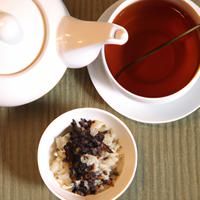
1 serving (250 grams) contains 150 calories, 4.0 grams of protein, 1.0 grams of fat, and 30.0 grams of carbohydrates.

Log this food in SnapCalorie

Nutrition Information
Calories |
141.5 | ||
|---|---|---|---|
% Daily Value* |
|||
| Total Fat | 0.9 g | 1% | |
| Saturated Fat | 0 g | 0% | |
| Polyunsaturated Fat | 0 g | ||
| Cholesterol | 0 mg | 0% | |
| Sodium | 9.4 mg | 0% | |
| Total Carbohydrates | 28.3 g | 10% | |
| Dietary Fiber | 0.9 g | 3% | |
| Sugars | 0 g | ||
| protein | 3.8 g | 7% | |
| Vitamin D | 0 mcg | 0% | |
| Calcium | 9.4 mg | 0% | |
| Iron | 0.5 mg | 2% | |
| Potassium | 47.2 mg | 1% | |
* Percent Daily Values are based on a 2,000 calorie diet. Your daily values may be higher or lower depending on your calorie needs.
Food Attributes
Source of Calories
About Tea over rice
Tea Over Rice, or Ochazuke, is a traditional Japanese dish made by pouring green tea, dashi, or hot water over a bowl of steamed rice, often topped with savory ingredients like pickled vegetables, grilled fish, seaweed, or sesame seeds. This simple meal is both comforting and versatile, commonly enjoyed as a quick snack, light lunch, or an easy way to use leftover rice. Ochazuke is low in fat and rich in nutrients, depending on the toppings. Green tea, a key component, is packed with antioxidants, aiding in digestion and offering potential health benefits. Additionally, certain toppings like salmon provide omega-3 fatty acids, while seaweed adds essential vitamins and minerals. However, sodium levels may be elevated if salty additions like pickles or soy sauce are used. Overall, Tea Over Rice offers a light, nutritious option rooted in Japanese cuisine that's easily customized to suit dietary preferences.



